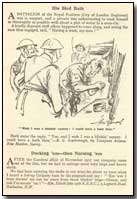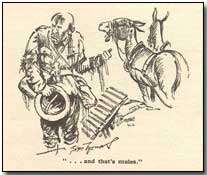Memoirs & Diaries - The Best 500 Cockney War Stories - Ducking 'em - then Nursing 'em and Other Stories
 Published in London
in 1921, The Best 500 Cockney War Stories
comprised, in the words of its newspaper publisher (The London Evening
News) "a remembering and retelling of those war days when laughter
sometimes saved men's reason".
Published in London
in 1921, The Best 500 Cockney War Stories
comprised, in the words of its newspaper publisher (The London Evening
News) "a remembering and retelling of those war days when laughter
sometimes saved men's reason".
The collection of short memoirs, some 500 in total, is divided into five categories - Action, Lull, Hospital, High Seas and Here and There. This page contains five stories from Lull, led by Ducking 'em - Then Nursing 'em.
Other sections within the collection can be accessed using the sidebar to the right.
Ducking 'em - then Nursing 'em
After the Cambrai affair of November 1917 our company came out of the line, but we had to salvage some very large and heavy shells.
We had been carrying the shells in our arms for about an hour when I heard a fed-up Cockney turn to the sergeant and say: "'Ere 'ave I been duckin' me nut for years from these blinkin' fings - blimey, and nah I'm nursin' 'em!"
Rfn. Elliott (late 17th K.R.R.C.), 9 Leghorn Road, Harlesden, N.W.
Salonika Rhapsody
Three of us were sitting by the support line on the Salonika front, conditions were fairly bad, rations were short and a mail was long overdue. We were fed-up. But the view across the Vardar Valley was some compensation.
The wadis and plains, studded with bright flowers, the glistening river and the sun just setting behind the distant ridges and tinting the low clouds, combined to make a perfect picture.
One of my pals, with a poetic temperament, rhapsodised on the scene for several minutes, and then asked our other mate what he thought.
"Sooner see the blinkin' Old Kent Road!" was the answer of the peace-time costermonger.
W. W. Wright, 24 Borthwick Road, E.15
A Ticklin' Tiddler
In January 1915, near Richebourg, I was one of a ration-party being led back to the front line by a lance-corporal. The front line was a system of breast-works surrounded by old disused trenches filled with seven feet or so of icy-cold water.
It was a very dark moonless night, and near the line our leader called out to those in the breast-works to ask them where the bridge was. He was told to step off by the broken tree. He did so and slid into the murky depths - the wrong tree!
We got him out and he stood on dry (?) land, shining with moisture, full of strange oaths and vowing vengeance on the lad who had misdirected him.
At stand-down in the dawn (hours afterwards) he was sipping his tot of rum. He had had no chance of drying his clothes. I asked how he felt.
"Fresh as a pansy, mate," was his reply. "Won'erful 'ow a cold plunge bucks yer up! Blimey, I feel as if I could push a leave train from 'ere to the base. 'Ere, put yer 'and dahn my tunic and see if that's a tiddler ticklin' me back."
F. J. Reidy (late 1st K.R.R.s), 119 Mayfair Avenue, Ilford
Biscuits and Geometry
During a spell near St. Quentin our company existed chiefly on biscuits - much to the annoyance of one of our officers, who said he detested dogs' food.
One evening he met the Cockney corporal who had just come up in charge of the ration party.
OFFICER: "Any change to-night, corporal?"
CORPORAL: "Yessir!"
OFFICER: "Good! What have we got?"
CORPORAL: "Rahnd 'uns instead of square 'uns, sir."
R. Pitt (late M.G.C.), 54 Holland Park Avenue, W.11
All that was Wrong with the War
Taking up ammunition to the guns at Passchendaele Ridge, I met a few infantrymen carrying duck-boards. My mule was rather in the way and so one of the infantrymen, who belonged to a London regiment, gave him a push with his duck-board.
Naturally, the mule simply let out and kicked him into a shell-hole full of water.
We got the unlucky fellow out, and his first action was to shake his fist at the mule and say: "There's only one thing I don't like in this blinking war and that's those perishin' mules!"
H. E. Richards (R.F.A.), 67 Topsham Road, Upper Tooting, S.W.17
Next - Not a Single Cockney and four other stories
A 'whizzbang' was a high-velocity, low-trajectory shell that made a shrill approach noise and then a sharp explosive report.
- Did you know?

